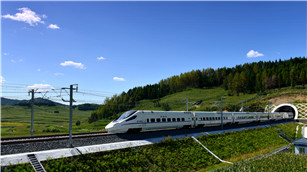Jilin gears up for another great year
By Liu Mingtai and Yang Cheng
( China Daily )
2013-01-24
|
Urban road construction has been prioritized in the cold northwestern province. |
Maintaining the momentum from 2011, when the province's GDP first broke 1 trillion yuan ($159 billion), Jilin's economy continued to grow in 2012 despite a global slowdown.
The exact GDP figure has not been revealed yet, but it is believed to have reached 1.2 trillion yuan.
Investment and urban infrastructure construction, including road, railway and aviation facilities, are expected to drive economic expansion in the province this year, local officials said.
The provincial government vowed to continue its industrial restructuring campaign while tapping the ample potential in the agricultural sector.
Reforms in urban areas, including advances in healthcare and education, are expected to make headway in the near future.
Also, the development plan includes the Tumen River area, which is expected to see faster growth.
"There will be a growing trend toward diversified trade with Europe, the United States, Japan, South Korea, Russia and the Hong Kong special administrative region this year," said Wang Fuyi, director of the Jilin Commerce Bureau.
Jilin plans to steadily increase foreign trade with emerging markets, including Australia, New Zealand, Latin America, Africa and the Middle East.
Wang's plan is to boost trade in state-of-the-art technologies and top-notch services.
He also expects local construction firms to get more orders from Japan, South Korea and Africa.
Wang Zhihou, director of the Jilin Economic Cooperation Bureau, said the province is dedicated to attracting more investment to its auto, oil chemistry, agricultural products processing, equipment manufacturing, electronic information and biopharmaceutical sectors.
Provincial leaders hope that more investors and entrepreneurs from the Yangtze River Delta, Pearl River Delta and the Bohai Rim will see Jilin as a good investment destination.
The province now has a batch of projects under way in the Changchun Xinglong Bonded Area, the Hunchun International Cooperation Model Zone, and the Sino-Singaporean Jilin Food Processing Zone.
The projects are in such profitable sectors as new materials, alternative energy, electronic information, equipment manufacturing and energy conservation.
Zhang Huanqiu, director of the Changchun Economic and Technological Development Zone, said the zone offers ample opportunities as a part of the nation's campaign to revitalize Northeast China, a traditional industrial center, and the opening-up of the Changchun-Jilin-Tumen River area.
The area's development plan was elevated to the level of a national strategy, creating one of the largest opportunities for Jilin, local officials noted.
Jin Xiong, Party chief of the Yanbian University, a key university in the area, said the strategy marks another step in opening Jilin to Northeast Asia.
One part of the strategy, the China-South Korea Rason Trade Zone, was opened last year, and it has since been operating smoothly.
The zone is expected to have a bright future in the sectors of energy, agriculture and forestry.
Su Jinghua, director of the Hunchun Bonded Economic Cooperation Zone, another leading economic zone in Jilin, noted that the open economy and trade structure of Jilin outshines other economic areas, and the zone is expected to be in the spotlight in 2013 now that it has mapped out a blueprint, strengthened urban infrastructure facilities and is offering top preferential policies.
Agricultural sector
Last year, the province's grain production volume hit a historic high when it reached 33.4 billion kilograms, accounting for 9.4 percent of nation's total.
Local officials also expressed their confidence in future plans to expand the agricultural sector.
Qin Guixin, president of Jilin Agricultural University, said the sector now is feeling the pinch in terms of quality and quantity.
"Only strong technological support can help," Qin said.
Echoing Qin, Yu Wenbo, deputy director of the provincial agricultural committee, said, "The province plans to promote advanced technologies on an even grander scale and offer more micro loans for farmers in a bid to reap a bumper harvest in 2013."
Yulin Mayor Li Hongliang noted that the city is pulling out all the stops to control pests in an effort to sustain its 3-billion-kg grain harvest annually.
"We have made a hefty investment in technological research and development," Li said.
Last year, a total of 152 deep processing projects, including 75 ginseng projects were carried out in the province's greenhouses, which were recently expanded to cover 66,666 hectares.
The breeding of rana sylvantic and the plantation area of edible fungi were also expanded significantly.
The gardening sector's total output exceeded 100 billion yuan last year, up 20 percent year-on-year.
Leading enterprises in the province initiated 165 projects involving an investment of 30 million yuan each. It was estimated that the sales value of the sector could top 350 billion yuan, up 13 percent year-on-year.
Faster track
Local tax and fee revenue surged to 100 billion yuan last year for the first time in the province's history.
Tax and fee revenue achieved a growth rate of 22.5 percent year-on-year, far higher than the province's GDP growth rate.
Urban citizens' disposable incomes grew by 14 percent, while those of suburban residents grew 16 percent in 2012, and all incomes exceeded the country's average.
The energy consumption per unit of GDP dropped by 6.5 percent during the period.
The emission of major pollutants was also cut significantly.
With an eye toward rapid development, large State-owned enterprises and private economic giants flocked to Jilin in 2012 to scout for talent and vie for partners.
The province staged a series of events, such as the China Top 500 Companies Summit and the 2012 Changbai Mountains Forum for Private Economy.
The central elements of the province's development strategy include the transformation of the economic mode and industrial restructuring.
The province is emphasizing its pillar industries and key enterprises, including auto heavyweight FAW and steel giant Tonggang.
It supported revisions to the standards for commercial vehicles and rectified the restructuring plan for local steel manufacturer Tonggang to merge with its Beijing counterpart Shougang Group.
Last year, a government-backed trade fair promoting investment in steel and cement products was held, resulting in orders for a total of 700,000 tons of steel products and 1.2 million tons of cement.
To help local firms in need of capital, the province provided loans worth 40 million yuan for 67 companies.
With government assistance, contracts for some 10,000 projects were signed between local banks and companies, and total investments hit 83 billion yuan.
Enterprise investments in technology upgrades grew by 34 percent during the period.
Large projects
According to the provincial government, some mega projects boosted industries, urban construction, livelihood and technological development last year.
The growth rate of investment stood at higher than 30 percent last year, ranking first among China's provinces and regions.
On Nov 21, CNR Changchun Railway Vehicles Co Ltd signed an agreement worth 1.7 billion yuan with Shanghai Shentong, a top logistics firm in China.
On Nov 22, new products produced by FAW-VW, such as the new Bora, Sagitar, Magotan 2012, CC2012 were on show at the Guangzhou auto show.
On Nov 23, the nation's largest ginseng production park, the Kangmei Pharmaceutical-Jilin Ginseng Industrial Park, was put into production and the output is expected to hit 20 billion yuan annually.
On Nov 28, some 14 projects within the Changchun Business Chamber Industrial Park were signed, and they involved a total investment of nearly 2 billion yuan.
On Dec 1, the Harbin-Dalian High Speed Rail began running through Jilin. It is the world's first high-speed rail in a region with an Arctic climate.
On Jan 4, an investment project worth 32.8 billion yuan was reached during a trade fair concurrently held during the Vasaloppet China, a top skiing competition. A Hong Kong firm also plans to pour 10 billion yuan into a hot springs town project.
Boosting domestic consumption is another focus for Jilin.
A total of 16,000 new chain stores were opened in Changchun, Jilin and Yanji.
A number of sales promotions were held last year at which a total of 7.6 billion yuan worth of goods were sold.
An e-commerce model zone was set up at the Changchun Jingyue National High-Tech Industrial Development Zone, which will help local companies ride the tide of the country's online sales boom.
The government also encouraged the sales of electronic appliances to urban areas last year. To date, the province has sold a total of 4 million sets of TV, driving farmer's spending up to 10 billion yuan. The government provided subsidies worth 1 billion yuan for them.
Hope for the future
Rapid economic growth in Jilin province is raising expectations for a better life, locals say.
Xue Zhiyuan, a migrant worker in Changchun, told China Daily that he expects his son will have the same educational opportunities as students who were born here.
This year, he hoped his son could be allowed to sit the national higher learning entrance examination in Changchun instead of making long journey to his hometown, a shabby village in Southwest China's Sichuan province.
Jia Pinhui, a post-graduate at the Changchun University of Chinese Medicine, said she was able to find a job in a top-level hospital through one of the 10 different job fairs she attended in Changchun.
Prospects are also looking better for Yang Wenbing, a laid-off worker, who said he expects his application for affordable housing to be approved soon now that the city government is constructing more apartments.
The province is also planning to build business incubation parks for students and migrant workers, said Zhang Zhijun, director of the Jilin Human Resources and Social Security Bureau.
Provincial leaders have also vowed improvements in other areas that affect the public quality of life.
Lu Dagao, director of the Jilin Education Department, said the province is committed to fair and transparent education. "We will not pass the buck," he said.
He said the department plans to take steps to alleviate shortages in suburban areas this year.
Qing Fuyi, director of the housing and urban-rural construction department, said the department plans to make the renovation of dilapidated housing the main priority in 2013.
In addition, the healthcare system will be further augmented.
Contact the writers at liumingtai@chinadaily.com.cn and yangcheng@chinadaily.com.cn.





